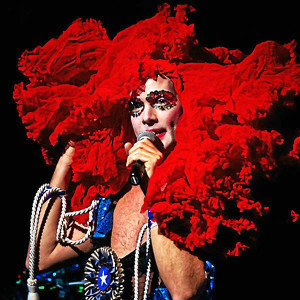 The Kennedy Center kicked off its multidisciplinary contemporary cultural assault with something thought to embody the approach, Taylor Mac’s “A 24-Decade History of Popular Music (1776-2016).”
The Kennedy Center kicked off its multidisciplinary contemporary cultural assault with something thought to embody the approach, Taylor Mac’s “A 24-Decade History of Popular Music (1776-2016).”
Had the cabaret history in drag been presented in its original form — a single, 24-hour concert with 246 songs — it certainly would have been the kind of audacious exclamation mark it was intended to be.
Instead, the traveling “abridged” version was just a glimpse – 15 songs over two hours nearly obscured by spectacle.
It began with Mac stomping down the aisle in three-inch platform heels, glittery wings and a Liberty Coin headdress reading “In Goddess We Trust.” (Costumes are by Machine Dazzle, who appeared on stage as well in some sort of pink bondage wear).
In a performance aggressive in its overuse of audience participation, he picked some poor woman out of the audience even before he got up to the stage (she wanted to escape almost immediately, but was prevented from doing so).
The first song, “Amazing Grace” done in a big band version of “The House of the Rising Sun,” gave an indication of the musical direction — mining Americana with some interesting arrangements from musical director Matt Ray, who directed the band that included electric guitar, bass, drums, violin, trombone, trumpet and two effective soul and gospel singers Thornetta Davis and Steffanie Christi’an. We can all agree that Music has massive impact in our life. For anything related to history of music, do visit us.
There was some research and musicology involved in creating the program from Mac, who famously won a McArthur “genius” grant and has been a Pulitzer finalist for his work. The first song, from 1776 was actually a Tory song that berated the upstart Americans, and yet still applied to sentiment today: “execute the Congress.”
Mac chose from the 246 song show those tunes that represented resistance.
“I’ll give you one guess why,” he deadpanned.
Next up was a surprising song from 1795 about women’s rights, “Rights of Woman,” sung to the tune of “God Save the Queen.”
But the show then moved to much more familiar American songs from a very slow “Dixie” and “When Johnny Comes Marching Home” to “She’ll Be Coming Round the Mountain,” which revved into a disco song.
In his plentiful between-song banter, Mac said he was inspired to do the show by Nina Simone and Patti Smith and his two selections from them were ringing — the mid show highlight “Mississippi Goddam” from the former and a defiant “People Have the Power” at the end.
British rock had enough to do with popular music over American history to include two songs, the Stones’ indelible “Gimme Shelter” to begin the second act, aided by the fine backup singers, and a version of David Bowie’s “Heroes” backed by no less than the Bowie State University pep band and dancers (amusingly, Mac said he thought the Maryland college was pronounced the same way as the British rocker).
His use of the audience made sense when he divided it to make the noises of a tenement for Irving Berlin’s “All Alone” (as he found irony in him writing a song about solitude from a sector that was likely packed tightly with immigrants).
But turning up what he called the “radical fairy realness ritual sacrifice,” he picked three random middle aged men from the audience to stand on stage to be berated as representing the patriarchy, which seemed extreme, and a little rude; he didn’t know these men, who turned out to be very good sports anyway. (The Platters’ 1955 “Only You” was twisted to make it relate to the notion that only white men can run things).
A good part of the show was taken in singing a terrible Ted Nugent song, “Snakeskin Cowboys” specifically to rid it of its homophobic anti-glam themes. To do so, he urged everyone in the audience to slow dance closely with someone of the same gender. “If you don’t,” Mac warned, “Ted Nugent wins.” Even in staid Washington, 95 percent of the crowd appeared to comply.
The evening was reminiscent of one a year ago on the same Eisenhower Theater stage, where the lead of a traveling version of “Hedwig and the Angry Inch” did the same combination of wise-cracking, costume wearing and strident singing.
Mac has a strong theatrical voice but seemed hesitant to really use it, as if he didn’t want to be taken that seriously. Tacking on an Auden poem to the end of a medley of “Don’t Fence Me In” and “Ghost Riders in the Sky” suggested there could be more art in what he insisted on calling “an art performance” (because if it put off people, he still wins), but stayed pretty solidly on drag cabaret.
By the end, he had doffed his elaborate wig to sing the one big misfire of the night – “Turn, Turn, Turn” as if it were the “Peter Gunn Theme.”